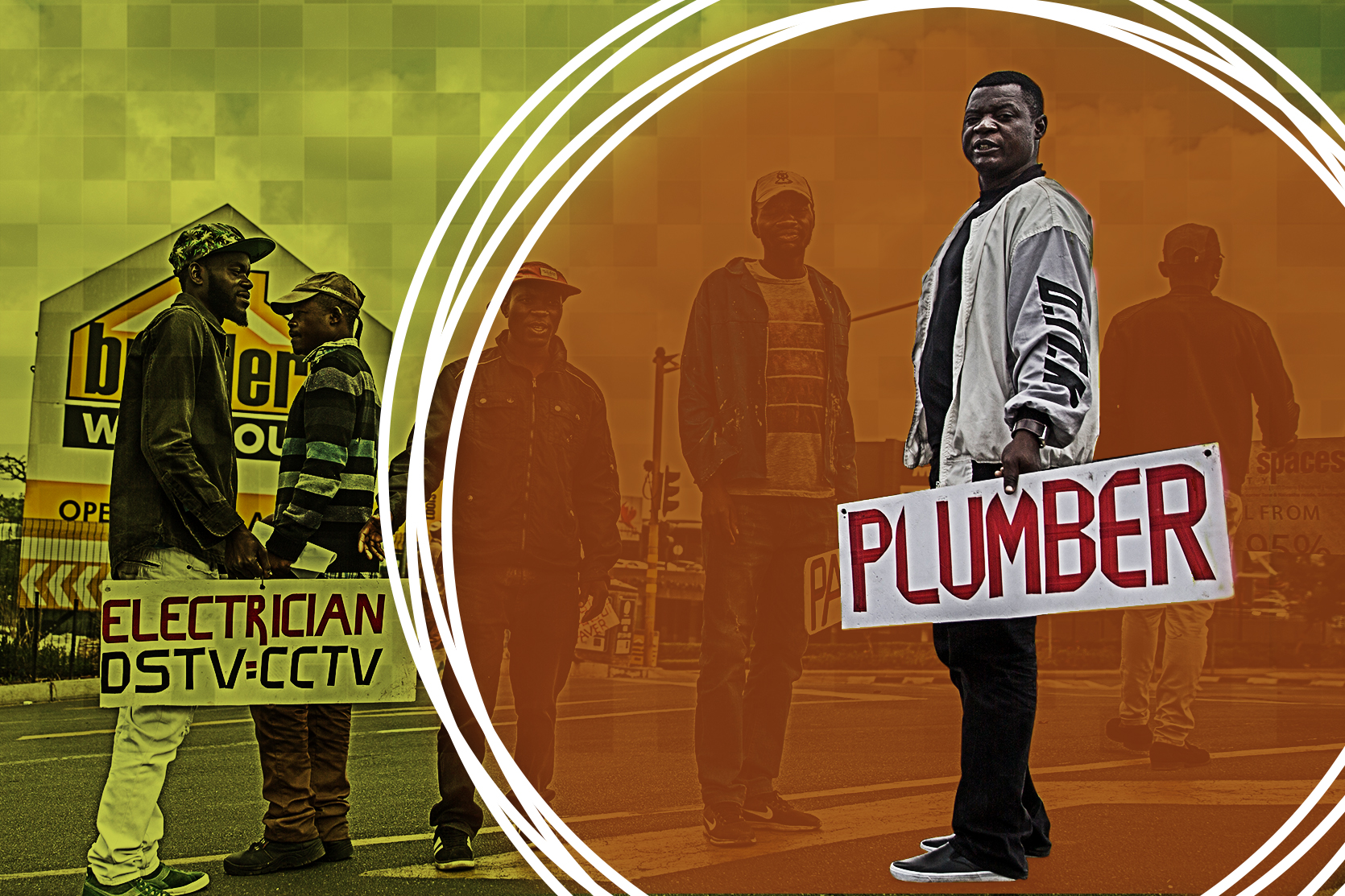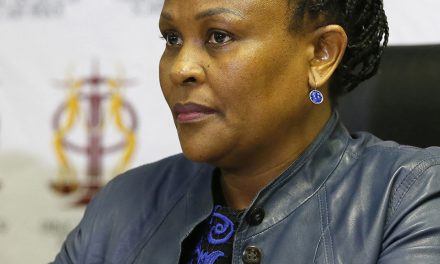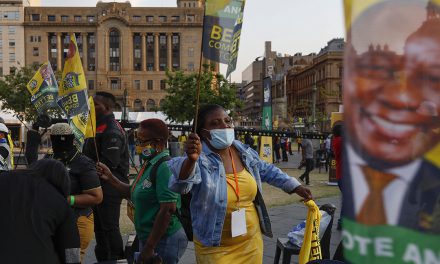
South Africa’s unemployment rates were already a crisis before the Covid-19 pandemic spread across the globe and took root in the country’s economic heartlands of Gauteng and the Western Cape.
At the start of the lockdown in March, many South Africans did not know anyone who had contracted Covid-19, but they did know people who had lost their jobs, been compelled to take paid or unpaid leave or had been furloughed.
South Africa’s unemployment rates were already a crisis before the Covid-19 pandemic.
Since then, many, many more people have been seeking support from the Unemployment Insurance Fund (UIF). In Johannesburg’s central business district, the queue outside the UIF office starts early in the morning. By the time staff open the offices, the queue is snaking down the street.
Many of the people in the lines have been unemployed since businesses closed with the national lockdown in March. Across the country, even university graduates are standing on physical and virtual social media street corners, holding up placards to passing traffic and asking for work.
Even university graduates are standing on physical and virtual social media street corners, holding up placards to passing traffic and asking for work.
In June, the unemployment numbers hit record highs of 30.1% – up from 29.1% in the final quarter of 2019 – pushing the economy further into recession. Office workers are not the only ones affected; the job losses are across the board. Large firms – including media houses such as Caxton, Associated Media Publishing and Media 24, steel producer ArcelorMittal South Africa Ltd, food producer Tiger Brands, retailers Dion Wired and Massmart, mining companies such as Samancor Chrome and telecommunications companies Telkom and Cell C – have announced staff cuts.
Almost invisible is the devastating impact on the informal sector. Hawkers have been pushed off the streets and home businesses have had to shut down. As so often with cases of illness, many hours of unpaid care work – often performed without recognition by women in the home – also remain unseen.
In June, the unemployment numbers hit record highs of 30.1%.
South Africa now has 7.1 million people without jobs (out of a labour force of 23.45 million). This is an underestimate as it reflects the state’s narrow definition of unemployed, which includes only those still looking for work. The reality is that many have long since given up. When those people are included, the rate rockets to around 39.7%; this is the “broad definition” and a truer reflection of reality. In early May, South African Chamber of Commerce and Industry chief executive officer Alan Mukoki said this could rise as high as 50%; the figure was in line with worst-case projections by the National Treasury.
A StatsSA survey in April found not only job losses but also reduced income. In fact, while 8,1% of those surveyed reported closing their business or losing their jobs, 25,8% reported that their incomes had decreased. Two-thirds (67,7%) of respondents were concerned about the potential long-term impact the Covid-19 pandemic would have on their financial situation.
South Africa now has 7.1 million people without jobs (out of a labour force of 23.45 million).
Government is also concerned about the long-term impact. Gauteng Premier David Makhura predicted that his province, the economic hub, could be hit with as many as two million job losses. Meanwhile, the rate of Covid-19 cases in the province is climbing sharply, with 3,000 cases registering daily. In July, Makhura told a media briefing that he might ask the National Coronavirus Command Council – which oversees the country’s response to the pandemic – to reintroduce some of the restrictions seen in earlier phases of the pandemic.
Lost jobs mean lost taxes and a contracting economy. A decade or more of state capture – when the resources of the state were systematically looted and key state institutions were undermined by supporters and “friends” of former President Jacob Zuma – had already left the country teetering economically. In April, Treasury warned lawmakers that the economy could contract as much as 16,1%, with as many as seven million jobs shed. The South African Reserve Bank’s Financial Stability Review for 2020, released at the end of May, did not bring good news, with forecasts that GDP would contract by 7% in 2020.
Lost jobs mean lost taxes and a contracting economy.
Even the best scenario points to devastating economic outcomes.
The unemployed have seen some relief through payouts from the UIF as part of the government’s Covid-19 Temporary Employer/Employee Relief Scheme (TERS). But this, too, has been mired with problems such as delays and changing directives that have hit small businesses – whose staff are supposed to be paid directly by the fund – hard. About half of the country’s 16,4 million workers contribute to UIF and at the end of May TERS benefits were extended to workers who had not been covered by the fund.
According to reports, the UIF’s Covid-19 TERS scheme received 456,698 valid applications that met the criteria out of 462,248, representing 4,447,722 employees out of 5,736,339, with R27.1 billion to be paid to the valid applications from June.
The UIF has gone from disbursing R17 million a day on average before Covid-19 to R700 million a day on average during the pandemic. But the TERS fund was budgeted for until June and when it ended an estimated R28 billion had been spent to support workers in distress, with compensation of between 38% and 60% for lost earnings. Since then, many South African workers have been left to fend for themselves.
The UIF has gone from disbursing R17 million a day on average before Covid-19 to R700 million a day on average during the pandemic.
Even the government recognises that businesses will continue to close. “As the pandemic continues, not all companies will make it out. Jobs will be lost and the demand for the UIF protections will increase,” Labour Minister Thulas Nxesi said.
Rather than close, some businesses are shedding jobs to survive, but there are real questions as to how long they can survive in the current climate. The Reserve Bank’s Financial Stability Review 2020 notes: “The projection of a sharp contraction in 2020 and a relatively weak recovery implies that the level of real GDP in 2022 is likely to be lower than that of 2018. As a result, financial firms could face challenges rebuilding capital buffers if they are worked down over the coming months.”
There is no sign that the pandemic will end any time soon, globally, or in South Africa. With optimistic estimations of a vaccine within a year, South Africa’s leading expert, Professor Salim Abdool Karim, said South Africans would have to learn to live with COVID-19: “We are looking at a situation where we will have this virus in our midst probably for several months, if not years.”
There is no sign that the pandemic will end any time soon, globally, or in South Africa.
What will be left of the country’s economy when South Africa starts to pick up the pieces? All indications are that it will take many steps back before it starts recovering. Some commentators think that Covid-19 might be a reset button on what creates jobs in the South African economy.
As workers settle down to the new normal of working from home, it might be time to rethink work – what defines it, how we reward it and where we perform it. The pandemic has allowed us to question long-accepted norms of the need to work in an office; of generating income to purchase those things we can make for ourselves; of working to a seasonal calendar that dictates what we do, and when.
The pandemic has allowed us to question long-accepted norms of the need to work in an office.
Many businesses are focusing on surviving right now, but South Africa will need a thriving economy to reel back the jobs lost. Without a timeframe for the end of the pandemic, it becomes harder to plan for that growth.
South Africa’s matriculants were among the first to go back to the classroom. Those who opt to go straight into the workplace after their final exams at the end of the year will find a very different jobs market to the one encountered by their parents.
Some suggest that a post-Covid-19 world needs more than rebuilding: we must reimagine our business world in order to grow. And all of this will require a greater acceptance of our digital world.
For the school leavers of 2020, it is a challenge no-one could have prepared them for.
We’d love to hear from you! Join The Wicked Conversation by leaving your comments below, or send your letter to the editor to richard@gga.org.
Paula Fray is a leading media trainer and coach who works across Africa and the Middle East. The former regional director for Inter Press Service Africa, she is the CEO of the pan-African communications company frayintermedia, which has worked to improve the quality of journalism in Africa since 2005.









Generally I do not read article on blogs, however I would like to say that this write-up very forced me to check out and do so!
Your writing style has been amazed me. Thanks, very nice post.
Hi Novo,
Many thanks for the response and the kind words.
Kindly keep an eye on our page for more*
Hi Novo,
Many thanks for the response and your kind words.
Kindly keep an eye on our page for more*
I am really worried about how this article will not reach policy makers due to their biases and those that it will reach would not be able to implement it due to lack of comprehension or appreciation of how dire the situation is in South Africa. Is it possible that it could be broken down up to municipality level so as to bring the message closer to home, especially when municipality think about increasing the rates & taxes to factor in the implications of who will not be able to afford payments.
Hi Vusi,
Many thanks for the response.
We agree that we need to bring these issues to the attention of policy makers. But it is also important that ordinary citizens begin to demand good governance and service provision from their elected and unelected officials. Every one matters in the demand for good governance.
Wonderful website you have here but I was curious about if you
knew of any user discussion forums that cover the same topics discussed in this article?
I’d really love to be a part of group where I can get feed-back from other experienced individuals that share the same interest.
If you have any recommendations, please let me know. Thanks a lot!
Hi Bao,
Many thanks for the response.
We are not aware of any discussion forms but raising your voice on this platform as well as on social media is essential to raise greater awareness of the need for good governance.